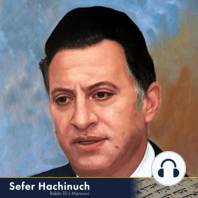20 min listen
Misva #262: “Hukot Ha’goyim” – Not to Follow The Gentile Practices
FromSefer Hachinuch
ratings:
Length:
20 minutes
Released:
Aug 18, 2022
Format:
Podcast episode
Description
The Torah commands in Parashat Kedoshim (Vayikra 20:23), “Ve’lo Telchu Be’hukot Ha’goy” – that it is forbidden to follow the practices of the non-Jews. The Sefer Ha’hinuch explains, based on the ruling of the Rambam (Hilchot Abodat Kochabim 11:1), that this applies even to customs such as style of dress. The Safra adds that we are not permitted to attend the kinds of events that non-Jews attend in “theaters, circuses and stadiums.” Likewise, it is forbidden to cut one’s hair in a manner that resembles the non-Jews’ styles. The Sefer Ha’hinuch writes that the Torah forbade following non-Jewish practices in order that we avoid excessive intermingling with gentiles, which could lead to foreign worship and intermarriage. The Maharik (Rav Yosef Kolon, 1420-1480), in one of his responsa (88), addressed the question of whether a Jewish doctor is permitted to wear the customary doctor’s uniform (such as the white coat in our times). This uniform would be worn not in order to imitate the gentiles, but rather for a practical purpose – so that people would know that he is a physician. Is this nevertheless forbidden? The Maharik replied that since this garment is worn for a beneficial purpose, and not in order to resemble the non-Jews, this is allowed. The Vilna Gaon (1720-1797), however, disagreed. Advancing a much more stringent view on this prohibition, the Gaon maintained that it is forbidden to dress in the style of the non-Jews regardless of the intent. The general consensus among the Halachic authorities permits adopting practices followed by non-Jews that are rational, and forbids adopting practices that have no rational basis. Thus, for example, some Poskim forbid placing candles on a cake for one’s birthday. While there is a rational reason to celebrate a birthday, there is no rational reason for placing candles, and then making a wish and blowing them out. Therefore, Rav Avraham Blumenkrantz (1944-2007) ruled that birthday candles violate the prohibition of “Hukot Ha’goyim.” Similarly, Rav Moshe Feinstein (1895-1986) discusses the question as to whether it is permissible to make a point of eating turkey on Thanksgiving. Leaving aside the question of whether having a celebration on this holiday is allowed, eating specifically turkey has no rational basis, and thus this might fall under the prohibition of “Hukot Ha’goyim.” Some communities do not wear neckties for this reason, claiming that there is no rational basis for wearing this particular kind of garment. Others, however, permit neckties, as they are worn for the purpose of looking respectable. The Poskim also discuss the question as to whether using the Gregorian calendar instead of the Jewish calendar might perhaps violate this prohibition. The underlying principle is that we must not be viewing the conduct of the non-Jews as a model and example for us to follow, as we are bidden to follow the dictates of the Torah. This prohibition applies in all times and places, and to both men and women. One who conducted himself in a manner resembling the gentiles is in violation of this command and is liable to Malkut. The Sefer Ha’hinuch concludes his discussion by emphasizing that we are to distance ourselves from the behaviors of the non-Jews, and devote ourselves fully to fulfilling Hashem’s will, and that those who do so will be rewarded both in this world and in the next world.
Released:
Aug 18, 2022
Format:
Podcast episode
Titles in the series (100)
Misva #8: Leaving Over Meat of the Korban Pesach: Daily Sefer Hachinuch - Brought to you by itorah.com by Sefer Hachinuch
